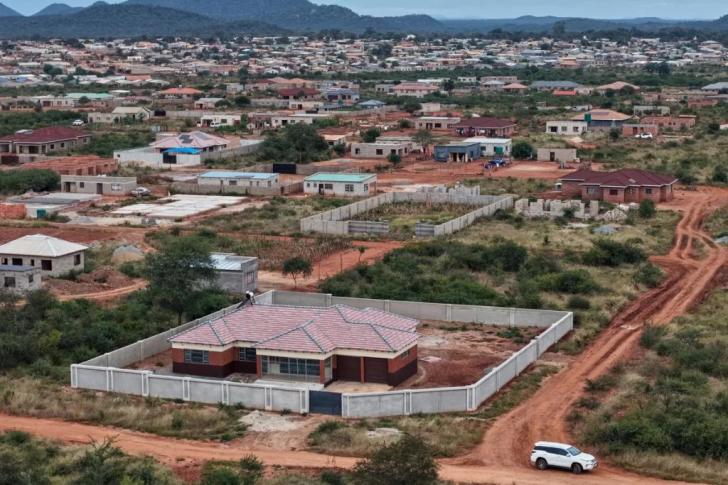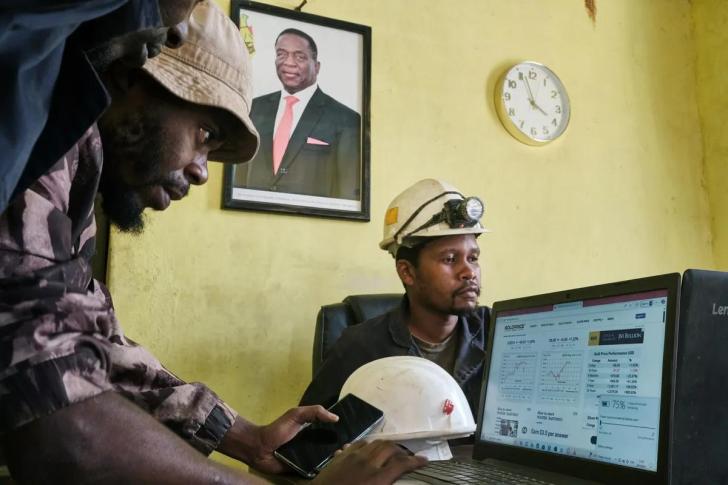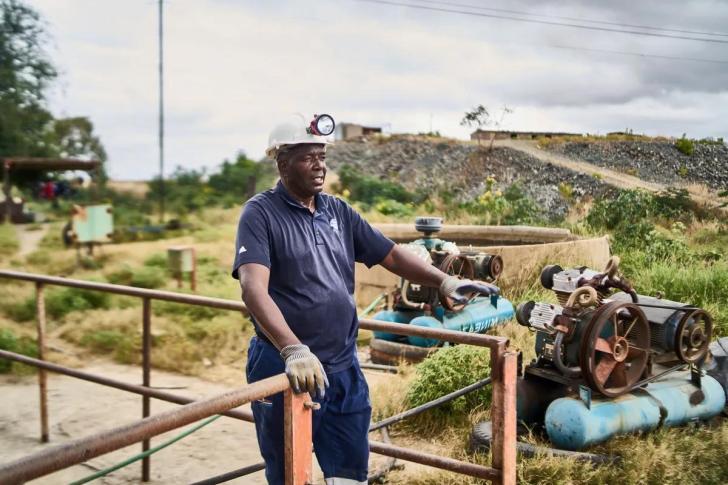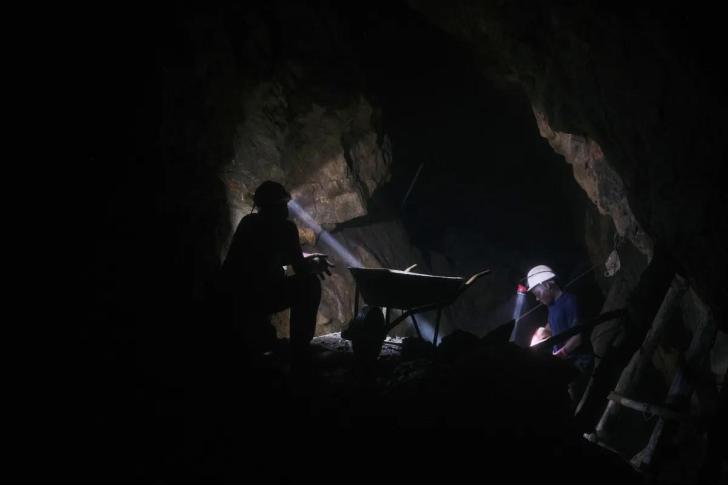News / National
Gold rally is bringing new riches to rural Zimbabwe
11 Jun 2025 at 09:43hrs | Views

A newly built home in a sprawling residential area of Filabusi where gold earnings are financing a building boom (Photographer: Zinyange Auntony/Bloomberg)
In Filabusi, the streets are packed with BMW X5s and Land Rover Defenders, modern houses paid for in cash are springing up and whisky is only sold by the bottle in the small town's bars.
The three-year surge in gold prices, driven to a record this year as US President Donald Trump's trade war bolstered its allure as a safe-haven, is enriching the country's more than 700,000 informal, or artisanal, miners. They are flocking to gold mining belts and throwing a lifeline to an economy that's been in economic turmoil since the turn of the century.
In the first five months of this year, those miners almost doubled the metal they delivered to a state refinery from a year earlier to more than 11 tons, swelling the country's export income. At the current pace of production the country could earn a billion dollars more from gold shipments this year than in 2024.
"The prices have been very favourable to the miners which is something we are so happy about," said Wellington Takavarasha, the president of Zimbabwe Artisanal and Small Scale for Sustainable Mining Council. "This year is looking very good. We must capitalize on this rally."
For the about 4% of people living in Zimbabwe, and their dependents, who are involved in the gold mining it's been a vital source of income. Formal employment has withered and millions of citizens have emigrated to South Africa, the UK and other countries in search of economic opportunities. For now, it's their only hope and one that depends on the high prices holding.
So far, there's no sign that the rally will come to an end. The price of the metal has surged 22% since Trump's inauguration and is up by three-fifths since the beginning of last year. It hit a record of $3,432 an ounce on May 6 and Goldman Sachs forecast it will reach $3,700 by year end.
That's pushed Zimbabwe's central bank to paying cash for gold deliveries, targeting a record 40 tonnes of purchases this year after it earned $2.5 billion in 2024, a 37% jump from the year earlier. Artisanal producers supplied three-quarters of the metal delivered in April, whereas a few years ago the majority of their output would have been smuggled out of the country.

Brighton Moyo with a newly acquired BMW bought from gold proceeds at a car wash in Filabusi (Zinyange Auntony)
For artisanal workers like Mxolisi Dube, clad in navy blue work overalls with a miner's torch strapped to his head as he walks through Filabusi, the gold price rally has been a boon. The 33-year-old began mining for gold illegally in 2008.
But now with higher prices and the cooperation of mine owners, who have begun to invite artisanal workers onto their properties to boost production, his earnings have surged.
"You are assured of getting something at the end of the month," said Dube, who has a copper dental filling and a brass chain around his neck. "You are protected. If you are not under a company you always have to run away."
Mine owners, struggling with dilapidated equipment and a lack of finance, are increasingly urging those operators to swap the pans they used to sift through river sand for gold flecks for picks and shovels to help them extract as much gold ore to process as quickly as possible.
"This means we always have ore available and are milling more," said Meli Nkulumo, plant manager at Macoomber 7 mine, which lies 12 miles west of Filabusi down winding dirt roads. Artisanal miners were invited onto the property two years ago.

Meli Nkulumo, a metallurgist checks a website displaying gold prices at the Macoomber 7 mine (Zinyange Auntony)
At the mine, workers use Elon Musk's Starlink internet service to compare the prices offered by the central bank to global benchmarks. Goldprice.org is their favored website.
"Higher gold prices are better for everyone," said Thulani Ndlovu, the acting mine manager. "We can also look forward to a raise in salaries."
Still, it's backbreaking work that's carried out around the clock. The miners break up rocks underground with picks, shovel it into a loader which is then winched to the surface. During their eight-hour shifts their only sustenance is maheu, a drink made from fermented corn meal.
But for artisanal miners the price surge has been life-changing and nowhere is that more evident than in Bekezela, a suburb of Filabusi where property owners are busy putting up brick houses ringed by electric fences and equipped with water storage tanks and solar panels. The town council is having to rezone more land for residential and commercial use and at car washes 4x4s queue to have the dust of the surrounding savannah rinsed off.

Bar manager Thabo Mpofu says the gold boom has attracted big spenders and he now sells whisky by the bottle. (Zinyange Auntony)
Drinking holes are busy with "all sorts of people" spending big, Thabo Mpofu, the manager of Next Generation bar, said, adding that he has seen clients buy bottles of Hennessey Cognac and pour them out on the ground as a show of wealth.
It's also curbed crime including invasions of local mines by illegal operators. "There's nothing bad here that happens," said Melusi Nyoni, the manager ofFred and Fernando mines, which are on the outskirts of Filabusitown, He now allows artisanal miners to work in shafts as deep as a kilometer (0.6 miles). "There is gold just all over," he said.

Mine manager Melusi Nyoni after visiting the underground tunnels (Zinyange Auntony)
Still, with rudimentary equipment and limited safety protocols, digging up the ore is dangerous work.

Gold miners at work in an underground tunnel at the Fred & Fernando mines.Photographer: Zinyange Auntony/Bloomberg
Informal miners accounted for 87% of the 186 deaths in Zimbabwean mining accidents, the Chamber of Mines said in its last annual report. As recently as late May, four died at a mine near Chegutu in northern Zimbabwe when a wall of earth collapsed onto them, according to local media reports.
But as long as the rally lasts, that's little deterrence for artisanal miners who, until recently, were eking out a livingby camping out and panning for gold in remote wild areas for several months.
"The high prices mean in the near future I will also be seen in a car," says Dube, a father of four. "I want a Toyota Hilux 4×4, with a 2.7-litre engine."
- With assistance from Godfrey Marawanyika
The three-year surge in gold prices, driven to a record this year as US President Donald Trump's trade war bolstered its allure as a safe-haven, is enriching the country's more than 700,000 informal, or artisanal, miners. They are flocking to gold mining belts and throwing a lifeline to an economy that's been in economic turmoil since the turn of the century.
In the first five months of this year, those miners almost doubled the metal they delivered to a state refinery from a year earlier to more than 11 tons, swelling the country's export income. At the current pace of production the country could earn a billion dollars more from gold shipments this year than in 2024.
"The prices have been very favourable to the miners which is something we are so happy about," said Wellington Takavarasha, the president of Zimbabwe Artisanal and Small Scale for Sustainable Mining Council. "This year is looking very good. We must capitalize on this rally."
For the about 4% of people living in Zimbabwe, and their dependents, who are involved in the gold mining it's been a vital source of income. Formal employment has withered and millions of citizens have emigrated to South Africa, the UK and other countries in search of economic opportunities. For now, it's their only hope and one that depends on the high prices holding.
So far, there's no sign that the rally will come to an end. The price of the metal has surged 22% since Trump's inauguration and is up by three-fifths since the beginning of last year. It hit a record of $3,432 an ounce on May 6 and Goldman Sachs forecast it will reach $3,700 by year end.
That's pushed Zimbabwe's central bank to paying cash for gold deliveries, targeting a record 40 tonnes of purchases this year after it earned $2.5 billion in 2024, a 37% jump from the year earlier. Artisanal producers supplied three-quarters of the metal delivered in April, whereas a few years ago the majority of their output would have been smuggled out of the country.

Brighton Moyo with a newly acquired BMW bought from gold proceeds at a car wash in Filabusi (Zinyange Auntony)
For artisanal workers like Mxolisi Dube, clad in navy blue work overalls with a miner's torch strapped to his head as he walks through Filabusi, the gold price rally has been a boon. The 33-year-old began mining for gold illegally in 2008.
But now with higher prices and the cooperation of mine owners, who have begun to invite artisanal workers onto their properties to boost production, his earnings have surged.
"You are assured of getting something at the end of the month," said Dube, who has a copper dental filling and a brass chain around his neck. "You are protected. If you are not under a company you always have to run away."
Mine owners, struggling with dilapidated equipment and a lack of finance, are increasingly urging those operators to swap the pans they used to sift through river sand for gold flecks for picks and shovels to help them extract as much gold ore to process as quickly as possible.
"This means we always have ore available and are milling more," said Meli Nkulumo, plant manager at Macoomber 7 mine, which lies 12 miles west of Filabusi down winding dirt roads. Artisanal miners were invited onto the property two years ago.

Meli Nkulumo, a metallurgist checks a website displaying gold prices at the Macoomber 7 mine (Zinyange Auntony)
"Higher gold prices are better for everyone," said Thulani Ndlovu, the acting mine manager. "We can also look forward to a raise in salaries."
Still, it's backbreaking work that's carried out around the clock. The miners break up rocks underground with picks, shovel it into a loader which is then winched to the surface. During their eight-hour shifts their only sustenance is maheu, a drink made from fermented corn meal.
But for artisanal miners the price surge has been life-changing and nowhere is that more evident than in Bekezela, a suburb of Filabusi where property owners are busy putting up brick houses ringed by electric fences and equipped with water storage tanks and solar panels. The town council is having to rezone more land for residential and commercial use and at car washes 4x4s queue to have the dust of the surrounding savannah rinsed off.

Bar manager Thabo Mpofu says the gold boom has attracted big spenders and he now sells whisky by the bottle. (Zinyange Auntony)
Drinking holes are busy with "all sorts of people" spending big, Thabo Mpofu, the manager of Next Generation bar, said, adding that he has seen clients buy bottles of Hennessey Cognac and pour them out on the ground as a show of wealth.
It's also curbed crime including invasions of local mines by illegal operators. "There's nothing bad here that happens," said Melusi Nyoni, the manager ofFred and Fernando mines, which are on the outskirts of Filabusitown, He now allows artisanal miners to work in shafts as deep as a kilometer (0.6 miles). "There is gold just all over," he said.

Mine manager Melusi Nyoni after visiting the underground tunnels (Zinyange Auntony)
Still, with rudimentary equipment and limited safety protocols, digging up the ore is dangerous work.

Gold miners at work in an underground tunnel at the Fred & Fernando mines.Photographer: Zinyange Auntony/Bloomberg
Informal miners accounted for 87% of the 186 deaths in Zimbabwean mining accidents, the Chamber of Mines said in its last annual report. As recently as late May, four died at a mine near Chegutu in northern Zimbabwe when a wall of earth collapsed onto them, according to local media reports.
But as long as the rally lasts, that's little deterrence for artisanal miners who, until recently, were eking out a livingby camping out and panning for gold in remote wild areas for several months.
"The high prices mean in the near future I will also be seen in a car," says Dube, a father of four. "I want a Toyota Hilux 4×4, with a 2.7-litre engine."
- With assistance from Godfrey Marawanyika
Source - Bloomberg

























